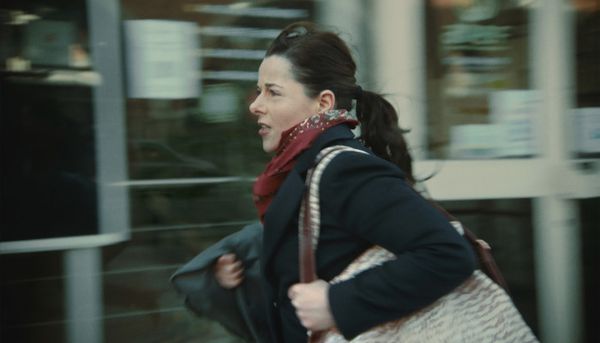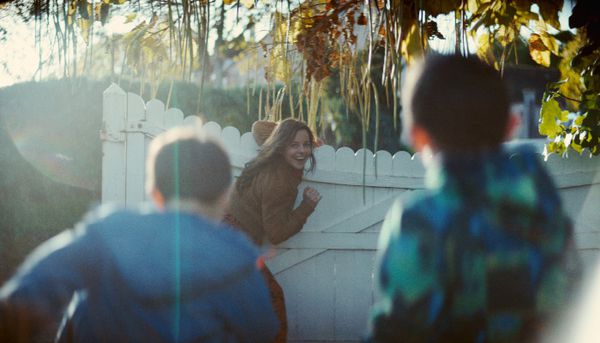 |
| You have expression in English, 'When it rains, it pours'. And I think that's the kind of situation she's in. We all live out at one point in our life, this kind of situation. |
When I caught up with him over Zoom as the film screened in Venice's Orizzonti section, I asked him if it was tricky to strike a balance with the script, so that it didn't turn into a sort of Clockwise farce.
 |
| Full Time director Eric Gravel: 'I wanted to be generous, that's the kind of film that I like when I go see a movie, that there's something happening' |
"You have expression in English, 'When it rains, it pours'. And I think that's the kind of situation she's in. We all live out at one point in our life, this kind of situation. It's a film so I want I don't want to talk about the daily routine, but it's about that point of our life where we say, 'Oh my God, at that point in my life, everything was impossible'. And I think that's what she is living. It's this moment where everything falls down. And I think it's realistic."
Gravel's film takes time to let us see the sorts of people and jobs that often go unnoticed as people hurry about their lives - the chambermaid, the doorman, the chilminder, the mother. These people basically keep the fabric of society running, even when strikes are happening, but they're also invisible to a degree.
He said: "My father was a working man, he always did small jobs all his life. So of course, it's something I grew up with. He was a single father. So I grew up in that kind of situation. It's always something that I had in mind for myself saying what I'm going to do in life? Will I be struggling like him? And that's why I think it's a subject that that that matters to me. And I think during the Covid we've seen that all these little jobs were so important, and very technical, like the one you you work in a hotel, we had to have for our actors, a lot of training."
The film gives a strong sense of the paradoxical chaos and precision of hotel work. Gravel admits that he likes to be precise as well.
"And Laure too," he said, "She's the same, we're kind of perfectionists. So we get along very well, in that sense."
Although the film is focused on and sympathetic to Julie's situation it also shows that she also has a blindspot when it comes to other people's work, not least an underling at the hotel who faces tough choices because of her.
 |
| Laure Calamy in Full Time. Director Eric Gravel says she's 'somebody who can be as comfortable in drama and comedy, but when you work with them, they have this art of mixing together both of them' |
One scene that encapsulates all the little stresses Julie is facing, is when she attempts to put together a trampoline. Having personally found it challenging to even put together a trampette, I ask whether that was borne out of Gravel's personal experience.
He said: "Yeah, I did the same. And I wasn't able to put the tough part by myself. So I knew it wasn't possible to do it by yourself. I used small stuff that I know. I just took the stupid things that we know well. When I come in train in Paris, I see the trampolines everywhere - and nobody uses them. So you use it for a month or two and the kids get, you know, get tired of it. And they don't use it. So that was a little thing that you know, they say make a movie about what you know."
The scene also gave rise to some improvisation from Calamy, which stayed in the film. Gravel said: "She was looking for the little thing to make it (the trampoline) happen and you always lose a piece and she was really looking for the piece. It was so funny because we I took that part because she was really looking for that thing."
Julie's whole stress level is constructed from little anxieties like this. And Gravel added: "There's nothing big and I didn't want to have. One thing I wanted to be sure of is that we don't judge her for her choices in life. And that's why we try to have you know, every detail that makes that makes sense that to say, Okay, yeah, that's the choice she made."
Julie's children play a key role in the film, often turning up just when she has a moment to relax, but there's a naturalism about it, so I ask Gravel if he has children himself.
"I have kids, he said. "but they're not at all like actor kids. Kid actors are, my God, they come from another planet."
 |
| Eric Gravel says he told the sound designer, 'I want to feel that the city like a wall that you go into' |
The actress' performance is supported by a rhythmic electro score from Irène Drésel and a sound design, including sirens or the thump of windscreen wipers that intrudes at just the right moment.
Gravel said: "We didn't put the music right on at the beginning, when we did the editing, first, we, we tried to find the beat without the music. So the, the sound designer, Valérie Deloof, she's an amazing sound designer, I'm very privileged to work with her. And when I send her the script, I said, 'I think I hear a lot of stuff'. And I said to her, 'The city has to be, you know, aggressive, you have to have the feeling when you leave the countryside and you come back to Paris after that there's something that is very aggressive'. I want to feel that the city like a wall that you go into.'. It wasn't easy, because the music and the sound, we were building both at the same time. I know that Valérie at one point said, 'I'm going to put my wipers in the music'. She was trying create ruptures.





















